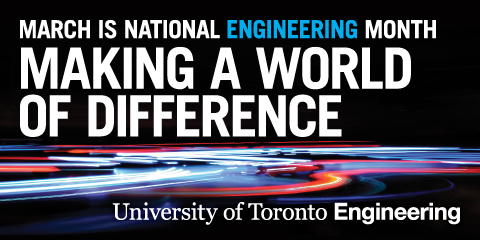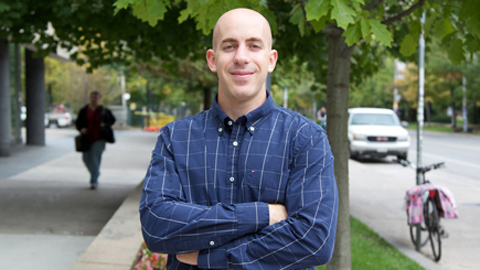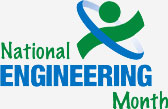 Slogging through the snow this winter has been tough. It’s blocked roads and highways, buried entire cities and left Canadians to dream of palm trees as they frantically scrape ice off their windshields.
Slogging through the snow this winter has been tough. It’s blocked roads and highways, buried entire cities and left Canadians to dream of palm trees as they frantically scrape ice off their windshields.
But in some regions, where the snow can strand people for weeks and months, the situation used to be a whole lot worse. That is, until Canadian engineer Joseph-Armand Bombardier invented the first machine that could ‘float on snow’ and connect northern communities far and wide: the snowmobile.
This March, U of T Engineering joins Canadians from across the country to celebrate the impact of engineers, who – like Bombardier and many of our Faculty’s researchers – are changing the world with their ideas, skills and action.
We invite you to explore and discover the impact of engineering for this year’s National Engineering Month: Making a World of Difference.
Our Events

- TTC’s Andy Byford on leading Canada’s largest transit system: To kick off NEM, the TTC CEO spent some quality time on campus with U of T Engineering students on February 26. Hosted by the Institute for Leadership Education in Engineering (ILead), Byford shared his leadership experiences, and then collaborated with students on solutions to some of the TTC’s greatest challenges. The Toronto Star participated in the event to profile three big transit ideas from U of T students. Read now.
- Purple Power at the CN Tower: On the evening of March 26, U of T’s Engineering Society will participate in building and setting off an intricate Rube Goldberg machine that will light the CN Tower purple – the colour traditionally associated with the engineering profession. Find out more.
- David Miller on Engineering Leaders: David Miller, President and CEO of World Wildlife Fund Canada, and former Toronto mayor, comes to U of T Engineering on March 5 to share his journey and discuss how engineers can bring effective leadership skills to the non-profit and political arenas. Learn more on the ILead website.
- WISE National Conference: The Women in Science and Engineering (WISE) chapter at U of T will host the second WISE National Conference in Toronto from March 22 – 23. The event brings together women with different backgrounds from across Canada to explore issues in their fields, build a greater community and inspire each other. Learn more.
- Chem Week: From March 24–28, the Department of Chemical Engineering & Applied Chemistry (ChemE) hosts the annual Chem Week. The festivities include the annual Troost Cup and ChemAzing Race on March 24, a Chem Town Hall on March 25 and a karaoke night on March 25 and talent show on March 26.
- MIE Speakers: Dive into the Department of Mechanical and Industrial Engineering with several informative talks and presentations, including: Professor Tzyh Jong Tarn on the next big things in robotics and automation (March 7) and Professor Goldie Nejat (MIE) on how to engineer robots to be effective human assistants (March 20). Read more on the MIE website.
- IBBME Lectures: Join the Institute for Biomaterials and Biomedical Engineering (IBBME) for a Shoichet Lab Special Seminar with Zhanfeng Cui (University of Oxford), founding director of the Ocford Centre for Tissue Engineering and Bioprocessing; a Special Lecture on March 5 from Professor Steven Prescott (University of Toronto); and, a Distinguished Lecture on March 17 from Professor Stephen F. Badylak (University of Pittsburgh).
- Engineering Happiness and Wellness: During NEM, two events will focus on the mental health and well being of engineers. The U of T Engineering Happiness club is hosting Dan Dolderman, an Environmental Psychologist from the Department of Psychology, on March 10 for a fun and informative talk on happiness. The Undergraduate Engineering Wellness Group also invites students to join a supportive group session on March 26 to learn how to cope with stress and change.
Our People
Here’s a snapshot of how some U of T engineers are making a world of difference.
Big Impact From Small-scale Robots

Professor Yu Sun‘s (MIE, IBBME) pioneering work in microtechnology and nanotechnology could greatly improve our future: less invasive surgery, cheaper disease diagnostics, safer transportation with micro-sensors, better product quality and the list goes on.
Professor Sun is an international leader in developing robotic and automation technology for researching biomaterials, such as creating precision instruments that help researchers understand and manipulate the world at the nano-scale.
For example, Professor Sun and his team use a robotic microscope to, in essence, inject diseases or genetic variations into mouse cardiac cells. This gives collaborators at Sick Kids Hospital the crucial cells to develop and test new medicines.
Read more in a recent Globe and Mail article: How tiny robots could help make babies.
Understanding What Goes Wrong

When an outdoor stage collapses at a Radiohead concert, or ceramic cookware spontaneously explodes on the kitchen stove, who do you call to find out why?
Meet U of T forensics engineer Professor Doug Perovic (MSE), who teaches Canada’s only forensics engineering course. Professor Perovic challenges students to apply engineering design concepts to real-world problems, learning the tools they need for high-level sleuthing.
He pulls on his experience testifying at dozens of legal trials. Recently, he set up experiments to demonstrate that the margin of safety was too low on certain glass-ceramic cookware, following the spontaneous explosion and injury of a Canadian man.
Reducing Air Pollution Caused by Airplanes

Air travel is a significant source of greenhouse gas emissions and air pollution, but Assistant Professor Adam Steinberg (UTIAS) plans to change that.
Through partnerships with Pratt & Whitney Canada, Rolls Royce Canada and the German Aerospace Centre, Professor Steinberg and his team are developing more efficient aircraft engines.
To do this, they’re using ‘high-repetition-rate’ laser-based measurement techniques, which allow them to determine the exact areas within a combustion system that are causing problems, as well as the underlying physical mechanisms.
By improving combustion in the aircraft engine, the amount of emitted air pollution is reduced, like nitrogen oxides (NOx), that contribute to smog, acid rain and climate change.
Toronto Star: Women Engineers, Invisibility Cloaks and More
 U of T Engineering was recently featured in a special NEM supplement in the Toronto Star. Highlights include:
U of T Engineering was recently featured in a special NEM supplement in the Toronto Star. Highlights include:
- An article on page N7 that shares the invisibility-cloaking device from Professor George Eleftheriades (ECE) and PhD student Michael Selvanayagam (ECE).
- An exploration of the current state of women in engineering on page N6, with commentary from Professor Susan McCahan, Vice-Dean, Undergraduate in the Faculty.
- A preview of what’s new at U of T Engineering, such as a new Master of Engineering in Cities Engineering and Management in CivE, a new Masters area of emphasis in ‘Sustainable Aviation’ at UTIAS, and The Entrepreneurship Hatchery accepting nearly double the number of student entrepreneur groups over last year.
Our Programs
Interested in learning more about our programs at U of T Engineering? Visit our undergraduate or graduate websites.
More About NEM
 To learn more about National Engineering Month, visit NEM Ontario and NEM Canada.
To learn more about National Engineering Month, visit NEM Ontario and NEM Canada.




